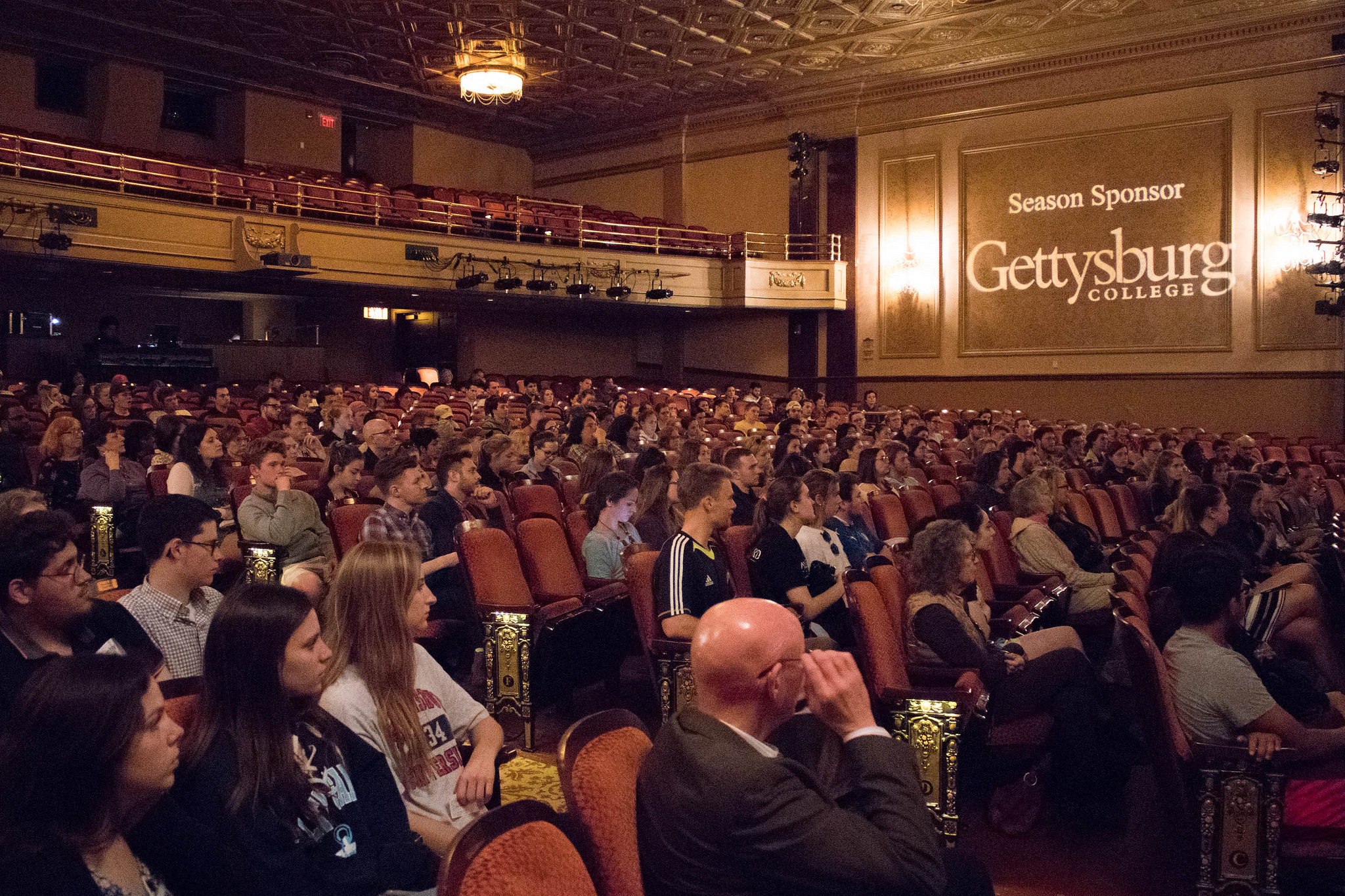‘Gettysburg Cycle’ concludes first year, prepares for second

A sizable crowd of students attended Bryant Terry’s speech on food justice, which was part of the “Year of Food”
Photo courtesy of Gettysburg College
By Benjamin Pontz, News Editor
Rolling out a new program comes with an inherent amount of uncertainty, and the inaugural year of the Gettysburg Cycle, intended as a campus-wide initiative, was no exception. With year one, the “Year of Food,” at its end, Dr. Caroline Hartzell, professor of political science and faculty coordinator for the Gettysburg Cycle, and student intern Jack Lashendock Burke ’20 are looking ahead to the upcoming “Year of Health” with an eye on increasing student engagement beyond required academic participation.
Hartzell and Lashendock agreed that, from an academic standpoint, many students were highly engaged with the theme through the lecture series and course assignments.
Numerous first-year seminars directly pertained to the food theme, and lecture attendance was expected as part of the college’s fourth-hour requirement for many courses. Moreover, the topic of food was integrated into many course research projects; Lashendock recalled speaking with a student who had all four of his classes last semester entail writing a paper that pertained to food in some way, although the specific topics were varied from British rations in World War I to depictions of food in the windows of a cathedral, reflecting the interdisciplinary accessibility of the theme.
Next year, the college will turn its attention to health, which, though not as explicitly “fun” a theme as food can be, Hartzell noted, is still something that is relevant to each member of the campus community and can be approached as a policy issue at local, national, and global levels, which is the goal in selecting a theme.
“The idea is not that you come out of here being a specialist [in one of the themes of the cycle], but this is a liberal arts college,” Hartzell said. “We should be learning — and it’s one of our stated curricular goals — how to approach issues from different angles and different understandings. [This is] stuff that matters to all of us.”
Hartzell will be on sabbatical next year, which will leave the Gettysburg Cycle without a specific faculty coordinator, but Lashendock will remain involved as the program intern. Presently, they are working on developing ways for the campus community to engage in non-academic contexts.
With respect to the Year of Health, several ideas are on the table for next year including a campus wide pandemic-style game to help illustrate the transmission of disease and a display of interesting items that have affected public health (positively or negatively) as fun ways to involve the campus. Next year’s first-year common reading text also pertains to health.
“I’m hoping things will get more traction with students,” Hartzell explained, elaborating that, specifically, she hoped fraternities would engage in a more “meaningful” way that transcends singular events (e.g., the annual chili cookoff).
She did note, however, that one student is working with his fraternity to bring a farmer’s market to campus before the spring is out to help further connect students to food, which she cited as an example of the type of engagement of which she would like to see more.
Gary Brautigam, Director of Dining Services, noticed increased interest in his department.
“This year as in most we are fortunate to connect with students that are interested in what the Dining Service is doing for the college in sustainability, learning about where our food comes from and how we are becoming more diverse in our food offerings,” he said.
Ultimately, Hartzell said that the Gettysburg Cycle is a voluntary program for both students and faculty, and its potential longevity depends on their will to participate and drive the program forward.
“Students often say they want other things at this college,” she said. “So why don’t they be a part of building it?”
Lashendock mentioned that he will be working more aggressively with the Student Senate to develop and promote programming in the coming year, and that students with ideas are welcome to contact him.
Reflecting on year one of the Gettysburg Cycle as a whole, Hartzell says that, overall, more faculty members participated than she had anticipated and the lectures were well-attended, but that she hopes more clubs and organizations get involved in future years.
“There are all these great clubs and they do their thing,” she said, “but it’s also a way to get clubs interacting with each other, and this can give them a focus to do that around. That seems like a neat thing to me. If people have ideas, they should be part of it.”
After the Year of Health, the third year of the cycle will focus on conflict of various types. The theme for the fourth year of the cycle has not yet been determined; current ideas include water, immigration and migration, and energy. Lashendock is quick to note that, with any of those possibilities in concert with the first three, thematic synergy will exist across the four topics of the cycle that will allow students to connect what they learn from year-to-year.
Hartzell agrees.
“It’s a way to put into motion all these things we say on paper that we do,” she said. “Let’s practice it.”
